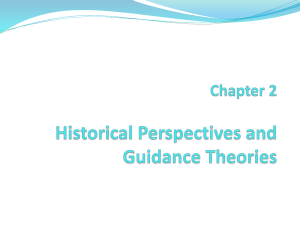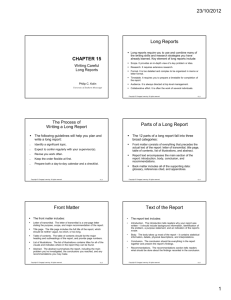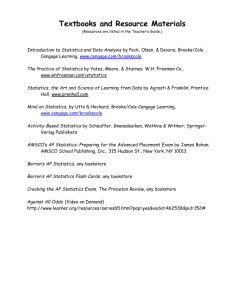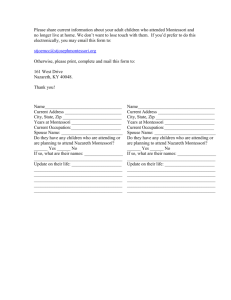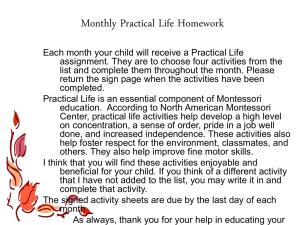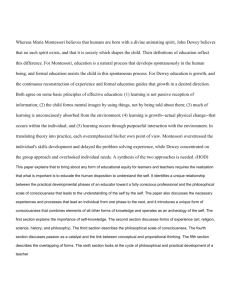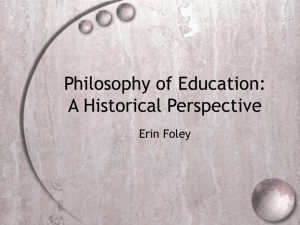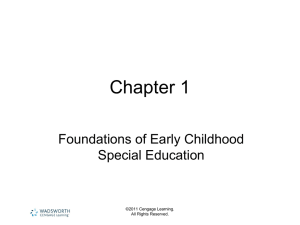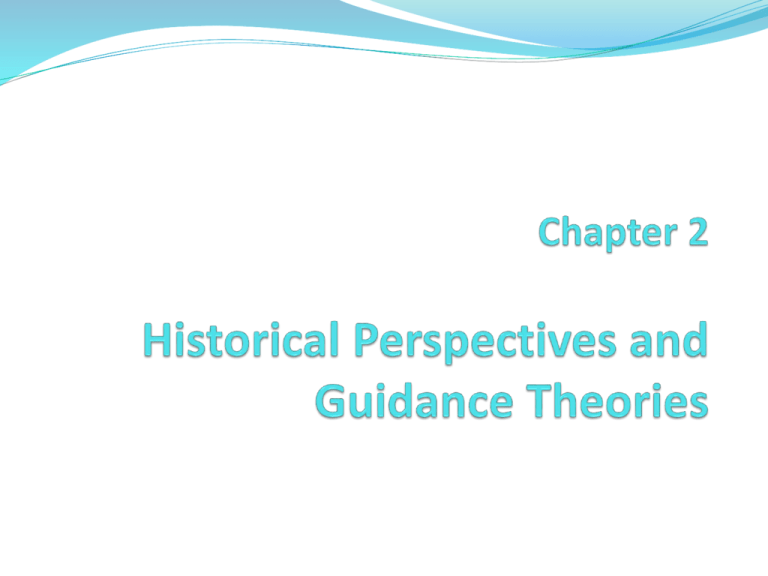
Strain of Changing Disciplinary
Traditions
Child care and guidance practices have
changed through the years
Parents who depend on child care want to
be assured that their children will receive
proper guidance
Early Pioneers
John Comenius (1592-1670)
The desire to learn can be excited by teachers, if they are gentle and persuasive
and do not alienate their pupils from them by roughness.
Johann Pestalozzi (1746-1827)
Teachers need to look first at the system if there are behavioral problems.
Robert Owen (1771–1858)
Punishment is never required, and should be avoided as much as giving poison
in their food.
©2011 Cengage Learning.
All Rights Reserved.
Early Pioneers
Friedrich Froebel (1782-1852)
Father of Kindergarten
The teacher should see the natural impulses of the child not as a
tendency toward evil but as the source and motivation for human
development that with guidance leads to character in the adult.
Maria Montessori (1870–1952)
Children educate themselves through absorption in meaningful tasks.
In this process they learn both self-discipline and responsible
decision making.
John Dewey (1859–1952)
Out of the occupation, out of doing things that are to produce results,
and out of doing these things in a social and cooperative way, there is
born a discipline of its own kind and type.
©2011 Cengage Learning.
All Rights Reserved.
th
Mid-20 -Century
Influences
Jean Piaget (1896-1980)
Constructivism
The modern ideal is cooperation—respect for the
individual and for general opinion as elaborated in free
discussion.
Alfred Adler (1870-1937)
Healthy development of the child results in an adult
ability for interconnectedness with social groups, to the
benefit of both society and the individual.
©2011 Cengage Learning.
All Rights Reserved.
th
Mid-20 -Century
Influences
Self Psychologists (1960s-1970s)
The developing self is the dynamic in human behavior.
Schools must address not just academics, but also the selfconcepts of learners.
Rudolph Dreikurs (1897-1972)
Teachers need to be leaders, not bosses. When their attempts
to achieve social acceptance fail, children show antisocial
behavior for a purpose, to achieve any of four mistaken goals.
Haim Ginott (1922-1973)
The “psychology of acceptance” means that the teacher’s task
is to build and maintain positive relations with each child.
©2011 Cengage Learning.
All Rights Reserved.
Discipline Trends in the 1980s
Emphasis on academic programming with younger
children lent itself to tightly controlled classrooms
(Elkind).
Obedience-based disciplines
Effects on children: humiliation, stigmatism, ‘winners’ and ‘losers’
Effects on teachers: reduced ability to use professional judgement
Effects on parents: discourages involvement in school if parent disagrees with
policy
Keeping guidance alive:
Early childhood education
Conflict resolution movement
Developmentally Appropriate Practice (DAP)
©2011 Cengage Learning.
All Rights Reserved.
Guidance Practice Today
Guidance means teaching children to learn from
their mistakes, rather than punishing children for
making mistakes.
A guidance approach teaches children democratic
life skills—the skills individuals need to function as
productive citizens and healthy individuals.
Democratic life skills include the ability to:
see oneself as a worthy individual and capable member of the group.
express strong emotions in nonhurting ways.
make decisions ethically and intelligently.
work cooperatively in groups to recognize and resolve common problems.
be understanding of human qualities and characteristics in others.
©2011 Cengage Learning.
All Rights Reserved.
Parent-Teacher Relations
Positive parent-teacher relations contribute at a
fundamental level to the success of the guidance
approach.
Froebel—mothers should take leadership in organizing kindergartens
Montessori—teachers as model for children and parents alike
Child study movement—nursery schools administered by parents
Head Start—home visits, classroom volunteering
Public schools—individual relationships between teachers and
parents for those with older children, ECFE for those with younger
kids
©2011 Cengage Learning.
All Rights Reserved.
Social Constructivist View
Alfred Adler’s analysis of behavior.
Human beings are capable of working
cooperatively, living together
peacefully, striving for selfimprovement and self-fulfillment, and
contributing to the common welfare of
the community
Effective Interpersonal Skills
Carl Rogers’ theory of personality is based on
humane and ethical treatment of persons
To reach full potential, human beings must have
positive regard from others that eventually leads to
the development of positive self-regard
Robert Carkhuff and George Gazda refined Rogers’
theories into practical, hands-on techniques
beneficial to therapists and educators
Predetermined Stages of
Mental Growth
Jean Piaget’s theory
Children’s mental development proceeds in
distinct stages qualitatively different from the
thinking of adults
Like John Dewey and Maria Montessori, Piaget
believed that early learning experiences have
tremendous impact on children’s long-term
cognitive development
Zone of Proximal Development
Identified by Lev Vygotsky
Believed adults play an important role
in children’s development and
learning
Scaffolding
Constructivists hold
the Piagetian view that…
Children construct their own learning
from innate cognitive structures and
external experiences
INTERNAL LEARNING EXTERNAL
STRUCTURES
EXPERIENCES
Montessori
Montessori
Maturationists believe…
Internal predispositions
Physiological characteristics are
inherited traits
Essential psychological makeup of a
human being is inborn
Behaviorists believe…
Environment is the primary
determinant of human behavior
Objectively observable behavior
constitutes the essential
psychological makeup of a human
being
Bronfenbrenner
Concept of Citizenship
Being cooperative
Having sense of fair play
Respecting rights of others
Initiative and self-reliance
self-starter, lifelong learner, creative problem-solver
Responsible work habits
established habits of promptness, effort, and pride
Sense of loyalty
recognizes that sometimes one’s own immediate
interests and desires may need to be pushed aside
for the good of the community
Autocracy
control by a single person having unlimited power
Anarchy
absence of any form of control
chaos and disorder
Democracy
principles of social equality and respect for the
individual within a cohesive community
Persistence and Patience
A gentle rippling stream
etches deep patterns in
solid rock
Pounding on rocks with
a sledge hammer
changes the shape of
rocks quickly, but causes
a lot of damage in the
process
Persistence and patience
are key to success in
positive guidance!

